Cars are supposed to run smooth & stable on a flat road, at any speed. And they generally do. It's only when they DON'T drive smoothly, that the owner starts worrying. Once you realize that your car is vibrating, what should you do to troubleshoot?
The first diagnostic step is to identify exactly what's happening. Focus on the driving conditions that accompany the vibration. Does it only occur under certain driving conditions? If so, when? Does it change with vehicle speed? When is the vibration problem most noticeable? Is it a noise (sound only) or vibration, or both? Where does the noise or vibration appear to be coming from? Can you feel it on the steering wheel, brake pedal or seat?
The 5 common culprits that cause your car to vibrate are:
- Tyres & wheels.
- Brakes.
- Suspension & steering components.
- Driveshaft (FWD) / Propeller shaft (RWD).
- Engine.
Each of the above problems causes different kinds of vibrations:
- Engine speed sensitive: The vibration is related to engine rpm and nothing else (not vehicle speed or driving conditions). The symptom appears or changes in direct proportion to engine rpm in any gear. Vibrations could be present even when your car is idling or revving at a standstill.
- Vehicle speed sensitive: The vibration is felt at specific speeds only. It may become worse with rising speed, or even disappear after you cross a particular speed.
- Acceleration / Deceleration sensitive: The vibration is only noticed when the speed changes (such as when driving off, overtaking, slowing down or coasting).
- Random: The vibration comes and goes with no obvious connection to engine rpm, vehicle speed or road conditions.
Let's look at each of the reasons for vibrations to occur, what kind of vibration may be felt and what can be done to resolve the problem.
Next Page >
Reason #1: Your Tyres & Wheels
The symptoms here are speed sensitive, and might be completely unnoticeable until a certain speed.
Solutions:
- Have the wheels balanced. Visit a bigger shop with a good dynamic wheel-balancing machine.
- Are there any obvious lateral movements / bulges? Replace damaged tyres that have bulged. Check for "runouts" on your wheels and tyres, both radially and laterally.
- Check for bends, warps and cracks on your wheels. Steel wheels tend to bend more easily, while alloy wheels may crack upon a severe impact. A bent steel wheel can be repaired on a wheel straightening machine, but there are few specialists for alloy wheel repairs in India.
- Was your car parked at the same spot for a few months, without being driven at all? Your tyres may have developed "flatspots". Driving around for a few kms should bring things back to normal.
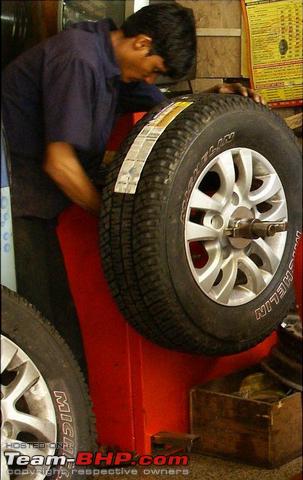
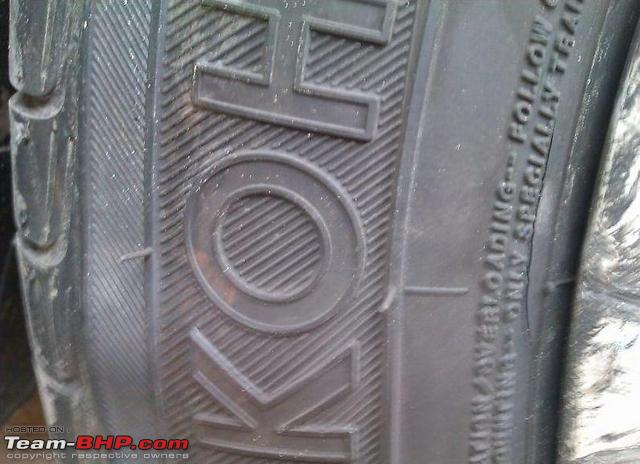
Next Page >
Reason #2: The Brakes
Here, the vibration occurs only when you apply the brakes.
Solutions:
- Is your car equipped with ABS? Your brake pedal WILL shudder if you slam on the brakes very hard, or on a loose / slippery surface. This is usually accompanied by a metallic clicking sound. Nothing to worry about. However, check that the ABS warning light (on the instrument cluster) isn't showing a malfunction.
- Your brake discs are warped or uneven. Check for uneven wear of your discs / drums. Lateral runout of any one disc (or radial runout of any one drum) shouldn't exceed 0.1 - 0.2 mm. Have the discs turned / skimmed on a lathe. Authorised service centers don't bother with skimming discs / drums, they simply replace them. An after-market garage can perform this simple job at a fraction of the cost of new discs. For your safety, it's imperative that the discs be replaced if they are worn out or warped beyond the maximum acceptable specifications.
- Are your brake pads / brake shoes worn out? They could be "skipping" on the disc / drum while braking. New pads of poor quality also tend to skip; always use OEM parts or better. Some cars may show poor or "grabby" brake grip with vibrations & noise when starting off from cold - this disappears as soon as the brakes warm up.
- Mostly older cars: A seized, rusted, dry or worn out brake caliper pin can cause vibrations while braking. Also likely if you have driven through water / mud and parked the car without a proper cleanup.
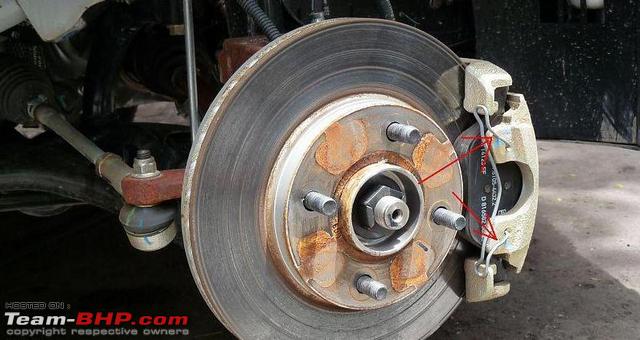
Next Page >
Reason #3: Suspension & Steering Components
The symptoms here are usually sensitive to vehicle speed. They include:
- Vibrations at the steering wheel. Side-to-side movement of the wheel is felt through the palm of your hand, especially at higher speeds (commonly described as shimmying):
- Look for a broken wheel bearing, a loose / worn out tie-rod end or a loose steering box.
- If you drive a Jeep, read this thread.
- High-pitched vibrations & noise at the front (without sway of the steering wheel) OR vibrations & noise from the rear. These increase with speed:
- Broken wheel bearings : Broken bearings also result in uneven tyre wear for that wheel.
- Jack up the car, hold both sides of the wheel and try to shake it from side to side to detect play. Do this for both front wheels. If there is play, it could be a broken wheel bearing, suspension strut / control arm or a loose bolt . A ball joint breaking or coming loose will also produce a swaying steering.
- Defective Linkages : Ask someone to turn the steering from side to side, and observe whether there is any play in the steering linkages. Replace linkages as required.
- Jack up and rotate each of the wheels and listen for any grating noise and / or vibrations coming from the center of the hub. Replace the wheel bearing as required.
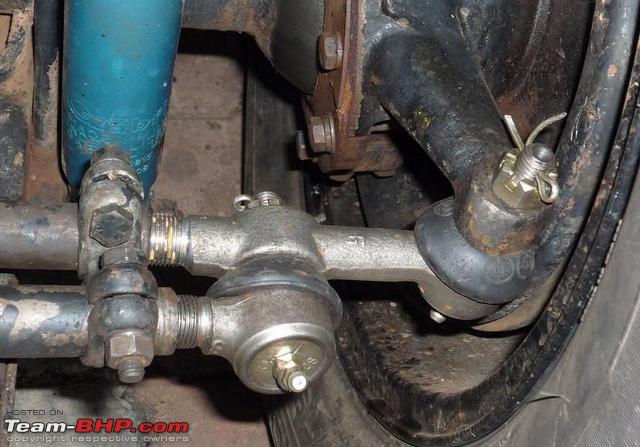
Next Page >
Reason #4: The Driveshaft (FWD) or Propeller Shaft (RWD)
Symptoms are usually acceleration / deceleration sensitive. Vibrations can also occur when the vehicle is being driven at a steady speed.
- With FWD cars, vibrations related to driveshafts are uncommon. If the car seems to bob up and down in the front:
- Did your front suspension suffer a severe hit recently? The suspension components could be bent or damaged. Bent suspensions are accompanied by unusual tyre wear.
- Is there a 'crackling' or 'kat-kat-kat' noise from the front end when taking a tight turn in reverse? Classic case of a worn out / broken CV joint. Excessive wear will lead to vibrations while driving. Either the driveshaft needs to be replaced, or the CV joint can be refurbished.
- Did you have a refurbished driveshaft installed? The CV joint may be too tight.
- Worn CV joints don't commonly cause vibrations, unless a ball is broken inside the joint.
- RWD - The rear of the car seems to bob up and down. The whole body shell vibrates in direct proportion to speed:
- Look for worn out universal joints (U-joints) on the propeller shaft. A worn U-joint or eccentric propeller shaft tends to vibrate more when decelerating from high speed.
- Either the U-joints or the entire propeller shaft needs replacement. Inaccurate replacement of new U-joints will perpetuate vibrations!
- Did you hit the underbody hard or beach your car recently? If the propeller shaft was hit, you can end up with an imbalanced shaft.
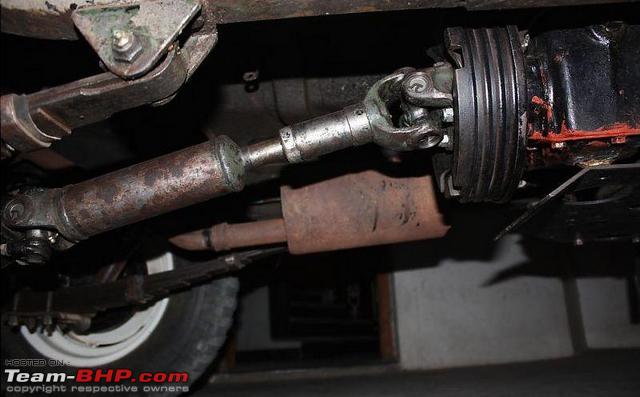
Next Page >
Reason #5: The Engine & Gearbox
Symptoms may be sensitive to rpm, acceleration, deceleration or even occur randomly.
- Worn out / Damaged Engine Mounts:
- Let the engine idle, switch it off and restart it. If the engine appears to be shaking / moving in an unusually high manner, despite sounding like its running consistently, then your engine mounts need a replacement.
- Inspect if the engine / gearbox mountings have deteriorated. Replace them with new ones.
- Sudden vibrations from the engine bay area, which might stop randomly:
- An unbalanced or loose cooling fan, or one with a broken blade(s). Vibrations will occur in a random manner, as and when the fan starts running.
- Defective cooling fan clutch or A/C clutch. Switch on the A/C and observe if noise & vibration appear to be coming from the area of the compressor.
- A misfiring engine creates vibrations in a random manner. The running of the engine will not sound consistently smooth. Search through Team-BHP to know more about the possible causes of an engine misfire.
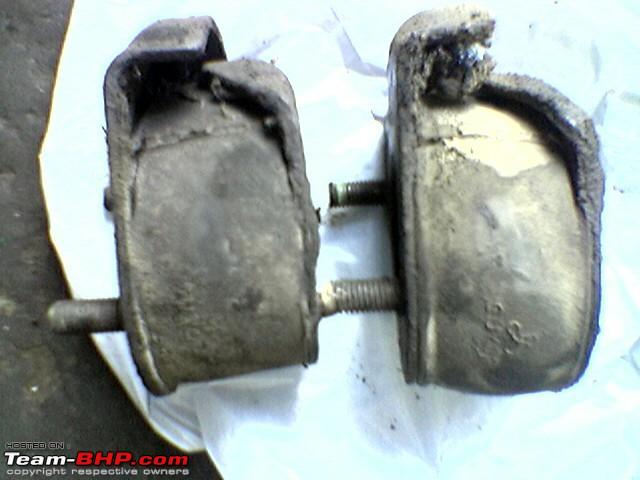
Next Page >
While we've learnt the most probable causes for vibrations in a car, prevention is always better than cure. Please bear the following points in mind:
- L-3 : Listen (to) & learn (the) language (of your car).
Your car talks to you in a language all its own, and it's up to you to be able to interpret what she is saying. If you are a complete noob in this area, here's a fun link to listen to those sounds, and perhaps recognize some of them. - T-4 : Tyre Treads Tell Tales.
An unbalanced tyre or wheel, a broken wheel bearing or an alignment gone bad....all of them will cause changes in the tread pattern of your tyres, even before your car starts vibrating (although misaligned wheels don't cause vibrations, they cause your car to pull to one side). Your ability to read the tyre tread pattern will preempt bigger issues in the future. Go through this useful resource. - W-5 : Wobbly Wheels Won't Work Well.
If your car or steering start to wobble suddenly, slow down and stop safely. Check that your wheel nuts & steering linkage nuts are in place and tightened. I know of malicious people who have partially loosened the wheel nuts of badly parked cars blocking their driveway, and of tyre shops that haven't fully tightened wheel nuts after a balancing procedure. The consequences of one of your wheels flying off the car at speed aren't hard to imagine.
Drive safe!
Image Credits : The pictures of this Article have been sourced from various Team-BHP threads. Thanks to BHPians for shooting & sharing them.












.jpg)




